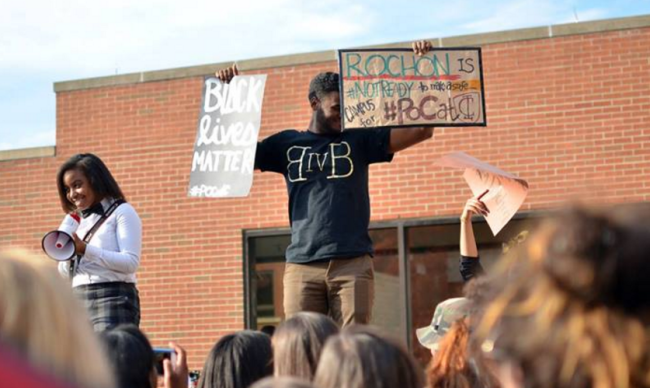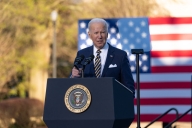You have /5 articles left.
Sign up for a free account or log in.

Students protest racial inequality at Ithaca College.
POC at IC | Facebook
Bracing for another round of student protests as the new academic year begins, college officials are pre-emptively calling for peace and unity on their campuses following a summer of gun violence and political unrest.
Last year, anger over race relations -- including issues that were specific to higher education and issues that were not, such as police killings of unarmed black men -- led to widespread student protests at campuses across the country. The demonstrations prompted institutions to make some policy changes in regards to support for minority students, as well as compelling several college administrators to step down. The protests also provoked considerable backlash, with several campuses receiving online threats against black students.
After a summer break that featured a divisive presidential primary season framed by more police killings of black men, the murders of several police officers and a mass shooting at a gay nightclub in Orlando, Fla., campus officials are not counting on campus protesters being any less active this year.
"The idea of campuses being places of widespread student protests is filtering down to students just enrolling in college," Angus Johnson, a scholar of student movements who teaches at Hostos Community College, already predicted in February. "We’re going to see an increase in what we saw happening last year."
A study published earlier this year indicated that the protests may be here to stay for some time -- and that colleges may be in the midst of an age of student activism not seen since the 1960s.
The annual American Freshman Survey found that one in 10 of last year’s freshmen -- this year’s sophomores -- said they have “a very good chance” of participating in student protests while in college, an increase of 2.9 percentage points over last year’s survey. Black students, in particular, said they planned on being activists, with 16 percent of students reporting that they planned on participating in protests.
The findings were among several from this year's survey that the researchers said point to the highest level of civic engagement in the study’s 50-year history.
Earlier this month, following the killings of black men and police officers in Baton Rouge, St. Paul and Dallas, Harris Pastides, president of the University of South Carolina, published an open letter addressing the violence. A year ago, the killing of nine African-Americans by a white supremacist at a South Carolina church placed the state at the center of a national debate over modern use of the Confederate flag.
“As we process these events, we ask ourselves: How do we respond?” Pastides wrote. “What should we do? What is the historical context? Will it happen again? Am I safe? Who is next? Should there be more laws? Should we restrict access to certain weapons? How does our nation move forward? How do we heal? Who can I talk to? How do we have these difficult conversations? While I don't have answers to all the questions, I do think there's something we can all do that may help.”
Pastides urged students and faculty members to “recommit to airing our views in a way that is civil and responsible and recommit to opposing violence in all of its of forms,” including violent language and hate speech.
“Come back to campus ready to learn and prepared for conversations to come,” the president wrote. “Most importantly, be ready to extend the hand of friendship to a new face.”
Other colleges issuing such letters include Doane University, which paraphrased Rep. John Lewis in asking protesters to "remain calm in the wake of these tragic events," and the University of Mississippi, which called on students to "support one another in these difficult times." Janice Abraham, president and CEO of United Educators, a risk management firm for colleges, said she expects to see many such letters as officials begin to welcome students back to campus and hope to "de-escalate conflicts that could occur."
At Ithaca College, several administrators on Wednesday urged students and faculty to sign a joint unity statement to “show solidarity for the victims of these tragic events” and to commit “to work together to seek answers to the difficult questions and show mutual respect for one another.”
In October, student protesters demanded that Ithaca’s president, Tom Rochon, resign over his handling of several racist incidents. Rochon, who did not immediately step down but said he will resign next July, is one of the statement’s signees. Nearly 700 other people had signed the statement as of Thursday, though it has also prompted criticism.
“It reeks of an ‘all lives matter’ sentiment that erases the discrimination many people experience, both on campus and elsewhere,” Zack Ford, a graduate of Ithaca College and LGBT editor at Think Progress, wrote in a Facebook post. “It sugarcoats and whitewashes the real problems the community is trying to solve, cheapening the valid concerns that students, faculty, staff and alumni have been raising for the past year.”
Similar criticism has been directed at a statement released this week by 30 presidents of historically black colleges. “America’s HBCUs were the birthplace of the idea that black lives matter to our country,” the presidents wrote.
While many praised the message and the presidents’ promise to organize a symposium on gun violence, others decried the statement’s lack of references to gay, lesbian, bisexual and transgender students.
“How come the letter does not mention the deaths of LGBT people of color?” Ben Webster, a student at the University of Maryland Eastern Shore, tweeted. “Black Lives Matter was started by queer women of color and yet our struggles are not addressed. Socioeconomic status, gender and race are mentioned, but not sexual orientation?”
One of the HBCU letter’s signees was John Silvanus Wilson Jr., the president of Morehouse College, who also released a separate letter last week.
Addressed to his “Morehouse sons,” Wilson discussed the shootings that occurred this summer, both of black civilians and police officers. He wrote that the "social climate across America is tragically disturbing," but that "black men have managed to survive and remain remarkably productive throughout the slave trade, post-Civil War atrocities, the civil rights movement and so many other challenging periods in the life of this nation." The president urged his students to “endure the recent disruption to your standard summer activities” and to look toward the future.
“My love goes out to each of you,” Wilson wrote. “Be mindful, be safe and be constructive. And we will see you next month.”








